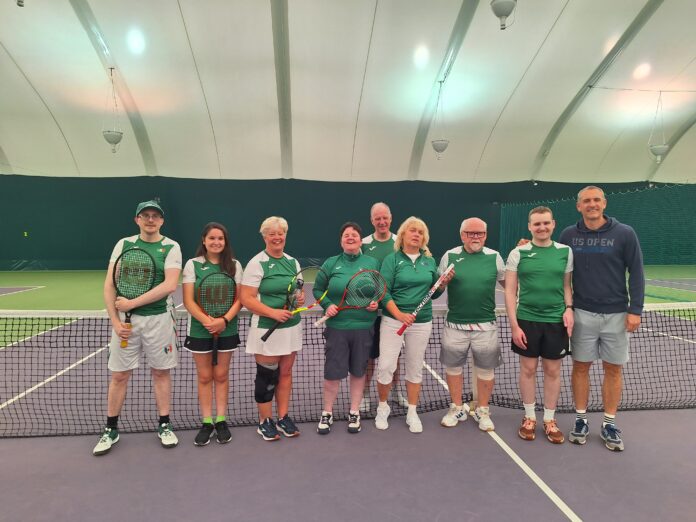
AT 60 YEARS OLD, Marguerite Quinn has carved out a remarkable journey in blind tennis after suffering a life-altering brain aneurysm in 2017.
Formerly a teacher and principal, the Limerick woman found her life flipped upside down having suffered severe brain injuries.
Through her discovery of blind tennis, however, Marguerite has embraced a new passion and excelled on both national and international stages as a representative of the Irish abroad.
Reflecting on her transition to tennis, having grown up with a number of other sports, Marguerite says she “came from a camogie background, a GAA background, so I suppose my hand-eye coordination, a lot of skills from the sports I had played, were transferable. Though I’d never played tennis, I could hit a ball.”
Though Marguerite isn’t fully blind, vision-impaired tennis players make use of a bell located inside the ball along with slightly altered rules which allow the ball to legally bounce multiple times on one side of the net, depending on the level of the player’s vision.
In 2023, the Mungret native participated in her first national blind tennis championship and won her category, becoming the All-Ireland champion.
“Within a year and a half, she was buzzing,” her coach, Wesley O’Brien, told the the Limerick Post.
Since then, Marguerite has competed internationally and represented Ireland at the World Blind Sports Games in Birmingham.
Wesley has been instrumental in Marguerite’s tennis journey. Coaching blind and visually impaired tennis since 2017, he first encountered the sport at a coaching conference in Bulgaria.
“Once I saw it, I kind of felt that I had to get involved in it,” he recalled.
Reflecting on Marguerite’s progress, Wesley highlighted the different levels of vision in blind tennis, noting “there are four categories of blind tennis,” each corresponding to a level of sight.
Marguerite competes in the B3 category, which allows for two bounces of the ball, despite the fact that she started in B2.
Though her vision has not improved since her accident, the Limerick woman’s performance was stellar enough to get her elevated to the higher vision category.
But Marguerite’s journey hasn’t been without challenges.
Due to her brain injury, she faces difficulties in processing information, meaning she must take a meticulous approach to her training.
“It takes me a bit longer to process things,” she says. “I’ve got to do things over and over again.”
She jokes that her constant repetitive movements in her kitchen drive her pet dog “crazy”.
“On the tennis court, I’m in control, I can control things, and if I get it wrong, well, I get it wrong, but it’s not the end of the world,” she says.
This sense of control has been vital for her, especially after the dramatic shift from her previous career to her current life.
“It’s very hard to go from leaving your office on a Friday to waking up three weeks later and knowing you’re never going to go back to that.”
As Marguerite prepares to represent Ireland once again at the upcoming Blind Tennis World Championships in Italy this September 25 to 29, her focus remains on continuous improvement and adaptation.
“If I accept, that means I’m okay with it. But if I adapt, I find a way around things,” she said, underscoring her approach to life after her injury.
In the beginning, doctors told Marguerite may never walk again. “If I had accepted it,” she said, “I’d still be sitting on that chair.”


